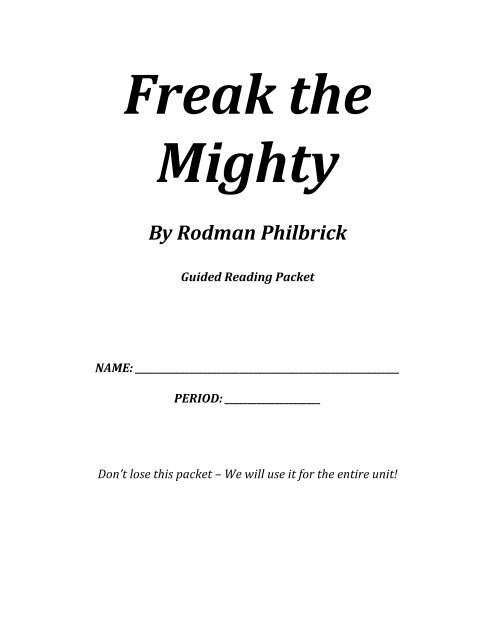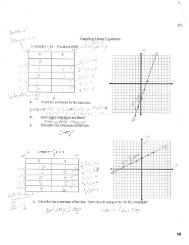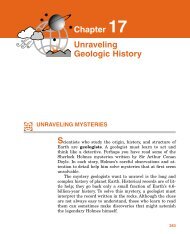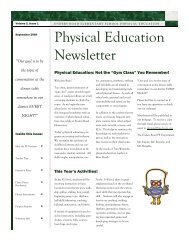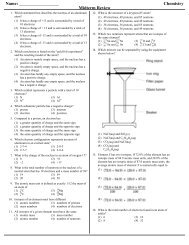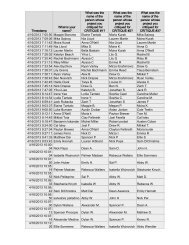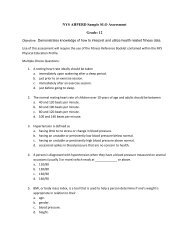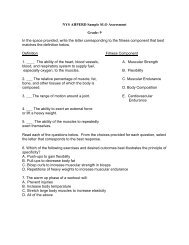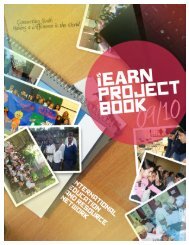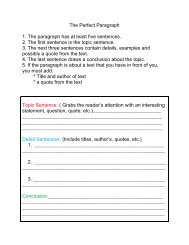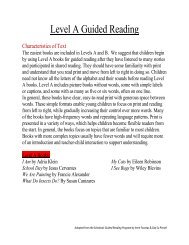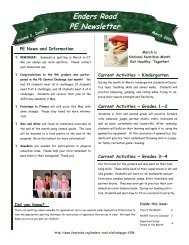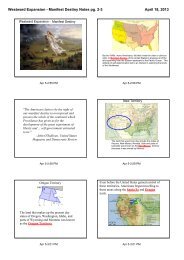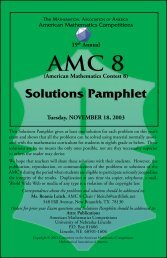By Rodman Philbrick
By Rodman Philbrick
By Rodman Philbrick
Create successful ePaper yourself
Turn your PDF publications into a flip-book with our unique Google optimized e-Paper software.
Freak the<br />
Mighty<br />
<strong>By</strong> <strong>Rodman</strong> <strong>Philbrick</strong><br />
Guided Reading Packet<br />
NAME: __________________________________________________________<br />
PERIOD: _____________________<br />
Don’t lose this packet – We will use it for the entire unit!
Directions for reading the book and completing this<br />
packet:<br />
• We will be using this packet as a guide for active<br />
reading as we read <strong>Rodman</strong> <strong>Philbrick</strong>’s novel, Freak<br />
the Mighty.<br />
• As we read in class and as you continue reading at<br />
home, please record your notes on the graphic<br />
organizer pages, in the space provided for the<br />
corresponding chapter.<br />
• There will be a quiz at the end of the unit, on Friday,<br />
May 18 th , so be sure to read carefully and take good<br />
notes as you do so.<br />
• The activities that are included in the packet (aside<br />
from the note-‐taking pages) will be completed in class.
Name ________________________________________ _ Period ___ __<br />
Pre-Reading Preparation<br />
Author Biography: <strong>Rodman</strong> <strong>Philbrick</strong><br />
© -<br />
- Freak the Mighty<br />
<strong>Rodman</strong> <strong>Philbrick</strong> was born o n January 22,<br />
1951 in Boston, Massachusetts, the first of<br />
four boys. He was raised in Rye Beach,<br />
New Hampshire and at tended Rye Schools.<br />
He began to write for his ow n pleasure in<br />
sixth grade, but felt that writing was “n ot<br />
cool” like being good at sports or be ing in<br />
the in-crowd so he kept it to himself.<br />
At the age of sixteen, <strong>Philbrick</strong> completed<br />
his first novel, a bo ok-length series of<br />
stories about two characters, similar to<br />
Freak the Mighty. The book was never<br />
published. He grad uated from Portsmouth<br />
High school in 1969, and went on to attend<br />
University of New Hampshire. He dropped<br />
out in his soph omore year, began working<br />
at various jobs as a carpenter,<br />
longshoreman, and boat builder, and even<br />
started a couple of businesses that were<br />
unsuccessful. He never gave u p on his true<br />
passion, however, and continued writing in his spare time.<br />
Eleven years after that first a ttempt, he was st ill unpublished. De termined to become a<br />
writer, he decided to write a g enre novel, as sugg ested by one of the publishers he had<br />
contacted. In a relatively short time, he was writing and publishing mysteries, detective<br />
stories, thrillers—whatever he could sell. After a couple of years he was able to give up his<br />
part-time jobs and settle into writing for a l iving. He le arned a lot about writing while<br />
working on the genre novels and actually liked it. Finally, he was making a living doing<br />
something he enjoyed.<br />
Before long he decided that he should try writing for kids. It was a break from the safety<br />
of writing genre novels, but h e had to do it, even though he felt it had no commercial<br />
possibilities. He just couldn’t let the story go; the inspiration to write Freak the Mighty was<br />
too strong. He foun d that it wasn’t work to him; it was fun! The most important novel in<br />
his career was finished in just six weeks.<br />
While continuing to write and publish adult thrillers under pen names William R. Dantz, W.R.<br />
<strong>Philbrick</strong>, and Chris Jordan, he went on to write many books for teens, with Freak the<br />
Mighty (1993), The Fire Pony (1996), Max the Mighty (1998), Last Book in the Universe<br />
(2000), REM World (2000), The Journal of Douglas Allen Deeds (2002), The Young Man and<br />
the Sea (2003), Lobster Boy (2005), and The Mighty (1998, a reissue of Freak the Mighty)<br />
among them. He has also written several other books with his wife, Lynn Harnett. Freak<br />
the Mighty won many honors, including the Judy Lopez Honor Book '93, ALA Best Books for<br />
Young Adults, ALA Recommended Books for Reluctant Readers, California Young Readers<br />
Medal Winner, and Arizona Young Readers Medal Winner.<br />
<strong>Philbrick</strong> lives with his wife Lynn, whom he married in 1980, and they divide their time<br />
between homes in Maine and the Florida Keys.
Name ________________________________________ _ Period ___<br />
Standards Focus: Exploring Expository Writing<br />
Directions: Using the biographical information about <strong>Rodman</strong> <strong>Philbrick</strong> on page 6, answer<br />
the following questions. Write the letter of the correct answer on the line.<br />
1. ________ What is the author’s purpose in writing this biography of <strong>Rodman</strong> <strong>Philbrick</strong>?<br />
a. To persuade the reader to read <strong>Philbrick</strong>’s books<br />
b. To describe <strong>Philbrick</strong>’s life experiences<br />
c. To inform the reader about <strong>Philbrick</strong>’s life and works<br />
d. To entertain the reader before reading <strong>Philbrick</strong>’s novel<br />
2. ________ Based on the information given in paragraph 2, the reader can assume that:<br />
a. <strong>Philbrick</strong> wrote Freak the Mighty when he was sixteen<br />
b. <strong>Philbrick</strong> never graduated from college<br />
c. <strong>Philbrick</strong> really enjoyed writing<br />
d. <strong>Philbrick</strong> was more suited to physical labor than to writing<br />
3. ________ <strong>Philbrick</strong> wrote the genre novels because through them he knew he could<br />
make a living. Why didn’t he just continue writing them exclusively?<br />
a. It was boring writing the same type of story over and over<br />
b. He felt he had a more important story to tell<br />
c. He ran out of ideas for mysteries<br />
d. Children were begging for more of his novels<br />
4. ________ Where would be the best place in the biography to insert information about<br />
<strong>Philbrick</strong>’s childhood?<br />
a. In paragraph one<br />
b. Between paragraphs one and two<br />
c. Before paragraph one<br />
d. After paragraph two<br />
Directions: Answer the following questions using complete sentences.<br />
5. The term genre novel is used in this biography. Using context clues from the<br />
information given, what do you believe is the meaning of the term?<br />
6. If you were given the opportunity to interview <strong>Rodman</strong> <strong>Philbrick</strong> for an article to be<br />
published in your school newspaper, what three or four questions would you ask him?<br />
© -<br />
- Freak the Mighty
Name ________________________________________ _ Period ___ __<br />
Freak the Mighty<br />
Anticipation/Reaction Guide—Before Reading<br />
Directions: For each of the following statements, compose one well-written sentence giving<br />
your reaction to the statement in your response. An example has been done for you. (Be<br />
prepared to read some of your responses aloud in class.)<br />
Ex. Everyone in every situation should always be treated equally.<br />
Sometimes people have different needs and treating everyone the same in every situation<br />
might even be unfair under certain circumstances.<br />
1. It is always best to speak the truth, no matter what the consequences.<br />
2. A true friend is a friend for life—one who will always agree with everything you do and<br />
back you up in any situation.<br />
3. Virtually everybody agrees that bullying is a bad thing, and for that reason it can be<br />
concluded that most people who bully others really don’t realize that they are doing it.<br />
4. People are most comfortable spending time with others who are just like themselves.<br />
5. Children who are raised by their natural parents have an unquestionably easier life than<br />
those who are raised by someone who is not their natural parent.<br />
6. Only smart people or those who work very hard will become truly successful in life.<br />
© -<br />
- Freak the Mighty
Name ________________________________________ _ Period ___ __<br />
Freak the Mighty<br />
Anticipation/Reaction Guide Reflection<br />
Pre-Reading Individual Reflection<br />
Directions: After several students have shared their responses with the entire class,<br />
get into small groups and discuss your answers as well as your group members’<br />
answers. Listen carefully to their responses, paying attention to their individual<br />
opinions. After you have discussed your “Before Reading” responses, answer the<br />
following questions below or on a separate piece of paper. Be sure to write in<br />
complete sentences and number your answers.<br />
© -<br />
1. Which statement triggered the most thought-provoking or interesting<br />
discussion among your group members? Summarize the discussion/debate.<br />
2. For any statements that you discussed, what were some of the strongest or<br />
most important points made by your group members? How did those<br />
statements affect your opinion?<br />
3. When you found that a member of your group disagreed with the way you<br />
feel about an issue, what was your reaction?<br />
4. Why do you think there might be so many differing opinions about the<br />
answers to even the simplest questions?<br />
- Freak the Mighty
Name ________________________________________ _ Period ___ __<br />
Note-taking for chapters 1-5<br />
For some students, reading can be a difficult, tedious task. Part of the problem is that many<br />
students do not have the tools they need to read for meaning, and lose interest because they cannot<br />
follow the action, do not understand, or cannot relate to the events or the characters.<br />
Below is a chart that you will be completing as you read Freak the Mighty. It is designed to help you<br />
understand the action, conflict, and characters and to eventually appreciate the author’s reasons for<br />
writing the book.<br />
Directions: For Chapters 1-5, use the chart below to help you keep track of your reading.<br />
Summarize the setting or settings, and then summarize each major event in the chapter. Try to<br />
keep your summaries short—just a few words or phrases. Do not write in complete sentences!<br />
Chapter 1 has been done as an example for you.<br />
Chapter<br />
1<br />
Chapter<br />
2<br />
Chapter<br />
3<br />
Chapter<br />
4<br />
Chapter<br />
5<br />
Setting<br />
No real setting given;<br />
he just flashes back to<br />
telling how he met<br />
Freak in daycare, but<br />
doesn’t describe the<br />
scene.<br />
Action Summary (Plot) and<br />
Characters Involved<br />
Max flashes back to meeting Kevin in<br />
daycare. Sees him again in a special bus<br />
when he is in about 3 rd grade, then he<br />
moves into a duplex down the street the<br />
summer before 8 th grade.<br />
Important to Remember<br />
From This Chapter<br />
Max had a temper—nicknamed<br />
Kicker; Kevin (Freak) had leg<br />
braces even then. Max is really<br />
growing and Grim and Gram<br />
notice that he is beginning to<br />
look a lot like his father.<br />
Now that you have read and taken notes on Chapters 1-5, make a prediction (educated<br />
guess) about what you believe will happen next in the novel.<br />
My Prediction:<br />
_________________________________________________________________________<br />
_________________________________________________________________________<br />
_____________________________________________ _<br />
- 5 - Freak the Mighty
Name ________________________________________ _ Period ___ __<br />
Standards Focus: Figurative Language in chapters 1-5<br />
One of the most captivating aspects of good literature is the use of figurative language, or<br />
ideas communicated beyond their literal meaning to create an image in the reader’s or<br />
audience’s mind. There are several types of figurative language, also called figures of speech.<br />
In this exercise, you will use the following figures of speech:<br />
• metaphor- a comparison made between two unlike objects: “The pillow was a cloud.”<br />
• simile- a comparison made between two unlike objects, using the words “like” or “as” in<br />
the comparison: “The pillow was like a marshmallow.”<br />
• personification- giving human qualities or characteristics to non-human objects: “The<br />
wind sang its sad song.”<br />
• hyperbole- truth is exaggerated for humor or emphasis: “I died when the boy I like<br />
finally talked to me.”<br />
Directions: Read each quote from Chapters One through Five. Look at the underlined<br />
figure of speech in the sentence, then decide what type of figure of speech it is. Finally<br />
identify the comparison being made or the object being personified or exaggerated. An<br />
example has been done for you.<br />
Ex. “I never had a brain until Freak came along and let me borrow his for a while, and that’s<br />
the truth, the whole truth.” (pg. 1)<br />
Figure of Speech: hyperbole (or metaphor)<br />
Analysis: Max wasn’t very smart until Freak came along and taught him how to learn.<br />
1. “Except I had a way of saying things with my fists and my feet even before we became<br />
Freak the Mighty...” (1)<br />
Figure of Speech:<br />
Analysis:<br />
2. “And Gram right away shushes him and says don’t ever say that, because little pictures<br />
have big ears, which makes me run to the mirror to see if it is my big ears made me look<br />
like Him.” (4)<br />
Figure of Speech:<br />
Analysis:<br />
3. “…he’s exploding out of his shoes.” (4)<br />
Figure of Speech:<br />
Analysis:<br />
4. “I’m just this critter hiding out in the basement, drooling in my comic books or<br />
whatever.” (6)<br />
Figure of Speech:<br />
Analysis:<br />
5. “At first she’s a glimpse, caught her going between the van and the front door, talking to<br />
the beards.” (7)<br />
Figure of Speech:<br />
Analysis:<br />
- 6 - Freak the Mighty
Name ________________________________________ _ Period ___ __<br />
6. “…she has this glow, a secret spotlight that follows her around and makes her eyes light<br />
up.” (7)<br />
Figure of Speech:<br />
Analysis:<br />
Directions: Now identify and underline the figure(s) of speech in the sentence, then decide<br />
what type of figure of speech it is. Finally identify the comparison being made or the<br />
object being personified or exaggerated.<br />
7. “…my feet are going wild that year and I keep tripping over everything. Cracks in the<br />
sidewalk, ants on the sidewalk, shadows, anything.” (8)<br />
Figure of Speech:<br />
Analysis:<br />
8. “If you didn’t know, you would think he was like a kindergarten creeper who forgot how<br />
to walk, he’s that small.” (11)<br />
Figure of Speech:<br />
Analysis:<br />
9. “I am amazed, because it does fly just like a little bird, flitting up and down and around,<br />
higher than I can reach.” (13)<br />
Figure of Speech:<br />
Analysis:<br />
10. “It’s cool and dim in there and you float like a cloud – no, you are a cloud…” (21)<br />
Figures of Speech: 1. ; 2.<br />
Analysis:<br />
Now, find two other examples of figures of speech from Chapters One through Five and<br />
write them on the lines. Identify the type of figure of speech and write an analysis.<br />
11.<br />
12.<br />
Figure of Speech:<br />
Analysis:<br />
Figure of Speech:<br />
Analysis:<br />
- 7 - Freak the Mighty
Name ________________________________________ _ Period ___ __<br />
Note-taking for chapters 6-10<br />
Directions: For Chapters 6-10, use the chart below to help you keep track of your reading.<br />
Summarize the setting or settings, and then summarize each major event in the chapter. Try to<br />
keep your summaries short—just a few words or phrases. Do not write in complete sentences!<br />
Chapter<br />
6<br />
Chapter<br />
7<br />
Chapter<br />
8<br />
Chapter<br />
9<br />
Chapter<br />
10<br />
Setting<br />
Action Summary (Plot) and<br />
Characters Involved<br />
Important to Remember<br />
From This Chapter<br />
Now that you have read and taken notes on Chapters 6-10, make a prediction about what<br />
you believe will happen next in the novel.<br />
My Prediction:<br />
_________________________________________________________________________<br />
_________________________________________________________________________<br />
_________________________________________________________________________<br />
- 8 - Freak the Mighty
Name ________________________________________ _ Period ___ __<br />
Standards Focus: Character Development in chapters 1-10<br />
The characters in a novel or play may be revealed to the reader or audience in a variety of ways.<br />
Your main impression of a character is formed through his/her speech or actions, physical<br />
description, mannerisms, surroundings, other characters’ reactions to that character, or the writer’s<br />
feelings about the character. A static character is one who changes very little or not at all<br />
throughout the story. A dynamic character is one who changes or grows significantly as the<br />
story unfolds.<br />
Max and Kevin, the two most important characters in Freak the Mighty, can both be described as<br />
dynamic characters. Each of them goes through major changes that are revealed through their<br />
dialogue and actions, and by what the author says about them. Other characters’ reactions to them<br />
also change throughout the story. These other characters could be static or dynamic characters.<br />
Directions: Locate specific quotes or descriptions of the characters below to show examples of their<br />
behavior or personalities from Chapters 1-10, using the clues above the box. Then find examples<br />
that show some of the changes they have undergone in the story so far, if they have changed at all.<br />
If the character has not changed, write “static character” in the box.<br />
What he says about himself<br />
1. Jack<br />
What someone else says about him<br />
Example of his actions<br />
2. Jack<br />
Example showing how he has changed<br />
3. Jack<br />
What he says about himself<br />
What someone else says about him<br />
Kevin<br />
Max<br />
- 9 - Freak the Mighty
Name ________________________________________ _ Period ___ __<br />
Example of his actions<br />
(Max)<br />
4. Jack<br />
Example showing how he has changed<br />
5. Jack<br />
What she says about herself<br />
What someone else says about him<br />
What someone else says about her<br />
Example of her actions<br />
Example showing how she has changed<br />
What she says about herself<br />
What someone else says about her<br />
Example of her actions<br />
Example showing how she has changed<br />
Gwen<br />
Gram<br />
- 10 - Freak the Mighty
Name ________________________________________ _ Period ___ __<br />
Note-taking for chapters 11-15<br />
Directions: For Chapters 11-15, use the chart below to help you keep track of your reading.<br />
Summarize the setting or settings, and then summarize each major event in the chapter. Try to<br />
keep your summaries short—just a few words or phrases. Do not write in complete sentences!<br />
Chapter<br />
11<br />
Chapter<br />
12<br />
Chapter<br />
13<br />
Chapter<br />
14<br />
Chapter<br />
15<br />
Setting<br />
Action Summary (Plot) and<br />
Characters Involved<br />
Important to Remember<br />
From This Chapter<br />
Now that you have read and taken notes on Chapters 11-15, make a prediction about what<br />
you believe will happen next in the novel.<br />
My Prediction:<br />
_________________________________________________________________________<br />
_________________________________________________________________________<br />
_________________________________________________________________________<br />
- 11 - Freak the Mighty
Name ________________________________________ _ Period ___ __<br />
Scavenger hunt: Setting and Mood<br />
One of the most important aspects of a novel is its setting. Setting includes:<br />
• Physical description: geography, weather, description of surroundings, etc.<br />
• Time: historical time period, season, time of day, etc.<br />
• Atmosphere: social, cultural, and political conditions<br />
Mood is the atmosphere or emotional state created by a piece of literature. Mood is usually<br />
described in expressions of feeling and emotions, such as fear, anger, hatred, contentment,<br />
loneliness, confusion, happiness, excitement, or jealousy, to name a few.<br />
In Freak the Mighty, even though most of the action takes place within Max’s bedroom, his<br />
yard, the school, and the hospital, other elements contribute a lot to the setting. Setting<br />
contributes a great deal to creating the mood of the novel.<br />
Directions: For each section, find specific examples from Chapters 11-15 that describe the<br />
setting. (You may go back and find examples from Chapters 1-15 if you prefer.) Then, tell<br />
how the setting affects the mood. An example has been done for you.<br />
Physical Description: Geography,<br />
Weather, etc.<br />
Time: Time Period, Season,<br />
Time of Year, Day, etc.<br />
Atmosphere: Social, Cultural,<br />
and Political Climate<br />
Tenements are falling apart; looks sad and<br />
smells like fish and sour milk; bikes and toys<br />
lying around, broken; kids are almost as<br />
busted up as the toys.<br />
How Does the Setting Affect the Mood?<br />
This place makes me feel depressed and<br />
sad, makes me feel sorry for people who<br />
live there. I feel fearful of the tenements,<br />
and imagine the people there are lonely.<br />
- 12 - Freak the Mighty
Name ________________________________________ _ Period ___ __<br />
Note-taking for chapters 16-20<br />
Directions: For Chapters 16-20, use the chart below to help you keep track of your reading.<br />
Summarize the setting or settings, and then summarize each major event in the chapter. Try to<br />
keep your summaries short—just a few words or phrases. Do not write in complete sentences!<br />
Chapter<br />
16<br />
Chapter<br />
17<br />
Chapter<br />
18<br />
Chapter<br />
19<br />
Chapter<br />
20<br />
Setting<br />
Action Summary (Plot) and<br />
Characters Involved<br />
Important to Remember<br />
From This Chapter<br />
Now that you have read and taken notes on Chapters 16-20, make a prediction about what<br />
you believe will happen next in the novel.<br />
My Prediction:<br />
_________________________________________________________________________<br />
_________________________________________________________________________<br />
_________________________________________________________________________<br />
- 13 - Freak the Mighty
Name ________________________________________ _ Period ___ __<br />
Life Skills—Improving Your Character<br />
We have all been in situations where we have not behaved toward someone as we should<br />
have, or perhaps you may have been the victim of such treatment. Sometimes we behave<br />
this way because our friends are doing it, or possibly because it makes us feel somehow<br />
superior. But often, it is because we don’t know how to react to the person’s personality,<br />
disability, or differences. In this activity, you will be practicing some techniques to help you<br />
better understand how someone might feel if they were mistreated, and you will discover<br />
some techniques for dealing with the “bully” type.<br />
Directions: Read each quote, then write a positive reaction that could be used to deal with<br />
the teasing. Try to use your sense of humor, which is one of the best ways to throw a<br />
bully off guard. If joking won’t work in a particular situation, think of something you could<br />
say to help the bully feel compassion and concern for their victims, instead of picking<br />
on others. (You may be called on to demonstrate your answers in front of the class.)<br />
(P. 7) “Hey you, Doofus! Yeah, you with the hairy face, take it easy with that box. That<br />
box contains a computer, you know what a computer is?”<br />
(P. 29) “Hey, you! Mutt and Jeff! Frankenstein and Igor! Don’t look around, I’m talkin’ to<br />
you, boneheads. What is this, a freak show?”<br />
(P. 76) “Forget it, Mrs. Donelli, his brain is in his tail! Ask him to count, he can paw the<br />
ground!”<br />
(P. 81) “As you know, heh heh, my personal opinion has always been that you’re lazy and<br />
stubborn and you didn’t want to learn.”<br />
(P. 109) “Now your grandparents say you’re nothing but a dysfunctional retard, but no kin<br />
of mine is a retard, and that’s a fact. So first thing, you’ve got to start acting smart. Use<br />
your head. We’ve got a situation going here, boy, so the way to handle it, you just do<br />
exactly what I say, no matter what. Understood?”<br />
(P. 121) “You can’t trust a cripple, but I guess you know that now, don’t you?”<br />
- 14 - Freak the Mighty
Name ________________________________________ _ Period ___ __<br />
Standards Focus: Elements of Style<br />
An author’s style is what makes his/her writing unique. Word choice, figurative language, imagery,<br />
rhythm, sentence structure, foreshadowing, symbolism, use of dialect, and other literary devices all<br />
work together to make an author’s writing distinctive. The style an author uses when he/she writes<br />
influences how well we understand and identify with the literature.<br />
<strong>Rodman</strong> <strong>Philbrick</strong> uses numerous techniques to create a style that makes Freak the Mighty a literary<br />
success. He uses imagery, hyperbole, even run-on and incomplete sentences extensively. He also<br />
uses some difficult vocabulary, long wordy sentences, and a bit of dialect.<br />
Directions: Identify the elements of style that are being used in each of the following excerpts,<br />
choosing from the box below. Elements may be used more than once, and there may be more than<br />
one right answer for each. Once you have identified the elements of style that have been used,<br />
explain the effect that these techniques have on the reader. An example has been done for you.<br />
Ex. “I never had a brain until Freak came along and let me borrow his for a while, and that’s the<br />
truth, the whole truth. The unvanquished truth, is how Freak would say it, and for a long time it was<br />
him who did the talking. Except I had a way of saying things with my fists and my feet even before<br />
we became Freak the Mighty, slaying dragons and fools and walking high above the world.” (1)<br />
Elements of style: long wordy sentences, sensory images, heightened vocabulary<br />
Effect: This passage uses sensory images (sight) to create for the reader a mental picture of the two<br />
of them walking somewhere up high, like up in the clouds. The sentences he writes are long and<br />
wordy, like run-ons, but they sound like a kid is writing, so I get the feeling it is really written by a<br />
kid. The vocabulary (unvanquished) makes me wonder what’s to come.<br />
1. “Gram and Grim, bless their pointed little heads, they’re my mother’s people, her parents, and<br />
they figured whoa! better put this little critter with other little critters his own age, maybe it will<br />
improve his temper.” (1)<br />
Elements of style:<br />
Effect:<br />
2. “So, finally I get bored in the down under and I’m hanging out in the so-called back yard, your<br />
basic chunk of chain link heaven. Grim keeps this crummy little mower in the shed, but what’s the<br />
point of mowing dirt, right?” (6)<br />
Elements of style:<br />
Effect:<br />
short or incomplete sentences clear rhythm pattern dialect<br />
heightened vocabulary sense of humor figurative language<br />
long, wordy sentences repetition sensory images<br />
3. “<strong>By</strong> this time I’m hunkering along in front of the place, trying to maintain a casual attitude,<br />
except like I said my feet are going wild that year and I keep tripping over everything. Cracks in the<br />
sidewalk, ants on the sidewalk, shadows, anything.” (8)<br />
- 15 - Freak the Mighty
Name ________________________________________ _ Period ___ __<br />
Elements of style:<br />
Effect:<br />
4. “All mechanical objects require periodic maintenance. We’ll schedule installation of a new<br />
propulsion unit as soon as the Fair Gwen of Air gets a replacement.” (13)<br />
Elements of style:<br />
Effect:<br />
5. “‘Gram must be your grandmother,’ he says. ‘Grim would be, I suppose, a sobriquet for your<br />
grandfather, based on his demeanor.’ ‘I go, huh?’ Freak grins and pushes back his yellow hair, and<br />
he goes, ‘Pardon my vocabulary. Sobriquet means ‘nickname,’ and demeanor means ‘expression.’ I<br />
merely postulated that you call your grandfather ‘Grim’ because he’s grim. Postulate means —’” (15)<br />
Elements of style:<br />
Effect:<br />
6. “There’s a place I go inside my head sometimes. It’s cool and dim in there and you float like a<br />
cloud—no you are a cloud, the kind you see in the sky on a windy day, the way they keep changing<br />
shape except you can’t really see it changing? It just sort of happens, and suddenly you realize the<br />
cloud that looks like a big hand with fat fingers now looks like a catcher’s mitt, or a big soft TV set?<br />
Like that.” (21)<br />
Elements of style:<br />
Effect:<br />
7. “Got any, dudes? ... Pay attention, I asked did you got any.” (30)<br />
Elements of style:<br />
Effect:<br />
8. “I hate the beach because the beach is stupid, the cool crowd looking sleek and tanned and<br />
aren’t-we-gorgeous?, and because if you saw me lying on a blanket you’d go, hey, why is that albino<br />
walrus wearing sunglasses?” (44)<br />
Elements of style:<br />
Effect:<br />
- 16 - Freak the Mighty
Name ________________________________________ _ Period ___ __<br />
Note-taking for chapters 21-25<br />
Directions: For Chapters 21-25, use the chart below to help you keep track of your reading.<br />
Summarize the setting or settings, and then summarize each major event in the chapter. Try to<br />
keep your summaries short—just a few words or phrases. Do not write in complete sentences!<br />
Chapter<br />
21<br />
Chapter<br />
22<br />
Chapter<br />
23<br />
Chapter<br />
24<br />
Chapter<br />
25<br />
Setting<br />
Action Summary (Plot) and<br />
Characters Involved<br />
Important to Remember<br />
From This Chapter<br />
Now that you have read and taken notes on Chapters 21-25, make a prediction about<br />
where you believe Max’s life will go from here.<br />
My Prediction:<br />
_________________________________________________________________________<br />
_________________________________________________________________________<br />
_________________________________________________________________________<br />
- 17 - Freak the Mighty
Post-‐Reading Reaction<br />
Directions: Look back at your Anticipation Guide on page 3. Reread the responses<br />
you wrote before reading the novel, and then answer the following questions, either<br />
below or on a separate piece of paper. Compare your responses from “Before<br />
Reading” to what you feel now, after reading the novel. Answer each question using<br />
complete sentences.<br />
1. Which of your responses has changed since reading the novel?<br />
______________________________________________________________________________________________<br />
______________________________________________________________________________________________<br />
______________________________________________________________________________________________<br />
2. For those statements you feel differently about after reading the novel, describe<br />
your reaction now, comparing it to your original response.<br />
______________________________________________________________________________________________<br />
______________________________________________________________________________________________<br />
______________________________________________________________________________________________<br />
______________________________________________________________________________________________<br />
3. Describe a scene from the novel that had a powerful effect on you and made you<br />
change your way of thinking.<br />
______________________________________________________________________________________________<br />
______________________________________________________________________________________________<br />
______________________________________________________________________________________________<br />
______________________________________________________________________________________________<br />
4. In small groups, talk to some of your classmates about their responses. How are<br />
their responses different now that they have read the novel?<br />
______________________________________________________________________________________________<br />
______________________________________________________________________________________________<br />
______________________________________________________________________________________________<br />
______________________________________________________________________________________________<br />
-‐-‐ 18 -‐-‐
5. Overall, are the feelings of your other group members the same or different from<br />
yours? Do any of their responses surprise you? Which ones? How?<br />
______________________________________________________________________________________________<br />
______________________________________________________________________________________________<br />
______________________________________________________________________________________________<br />
______________________________________________________________________________________________<br />
______________________________________________________________________________________________<br />
______________________________________________________________________________________________<br />
6. Why do you think there might be so many different opinions and viewpoints?<br />
What do you feel has contributed to the way you and your classmates responded to<br />
each statement?<br />
______________________________________________________________________________________________<br />
______________________________________________________________________________________________<br />
______________________________________________________________________________________________<br />
______________________________________________________________________________________________<br />
______________________________________________________________________________________________<br />
______________________________________________________________________________________________<br />
-‐-‐ 19 -‐-‐
Name ________________________________________ _ Period ___ __<br />
Just For Fun! Freak the Mighty<br />
Final Quiz Review Crossword<br />
1 2<br />
5 6<br />
3 4<br />
7 8<br />
9 10 11<br />
12 13<br />
18 19<br />
14<br />
15 16 17<br />
20 21 22<br />
ACROSS<br />
29<br />
1 Kevin gave Max this in the hospital<br />
4 let the class get out of hand<br />
6 tried to untie Max, but was strangled<br />
9 real author of Freak the Mighty<br />
12 science of designing replacement parts for the<br />
human body<br />
13 Kenny Kane's friend who helped him hide out<br />
14 Max's grandfather who was raising him<br />
15 Kevin got one of these for his birthday<br />
16 Killer Kane<br />
20 Kevin and Max went to the sewer to find this<br />
21 remembering is just an ______ of the mind<br />
22 his best friend taught him a lot about words<br />
24 school principal<br />
25 what Kenny and Max did in the old lady's<br />
apartment<br />
27 abducted Max<br />
28 Kevin had one of these on his birthday<br />
29 invited Max to dinner at her house in apology<br />
27<br />
24 25<br />
26<br />
28<br />
DOWN<br />
2 where Kenny went after Max went back home<br />
3 told the police where to find Kenny and Max<br />
4 what Kevin's dad must have been<br />
5 wanted bionic surgery to get a new body<br />
7 Kevin gave Max this for Christmas<br />
8 The boys named themselves this<br />
10 name Max and Kevin called Loretta because she<br />
had her purse stolen<br />
11 Max's nickname in day care<br />
17 a nickname for the tenement houses<br />
18 treated Max like a son<br />
19 name Grim and Gram liked to call Max<br />
23 Kevin choked on this at school<br />
26 picked on Max and Kevin all the time<br />
- 20 - Freak the Mighty<br />
23


